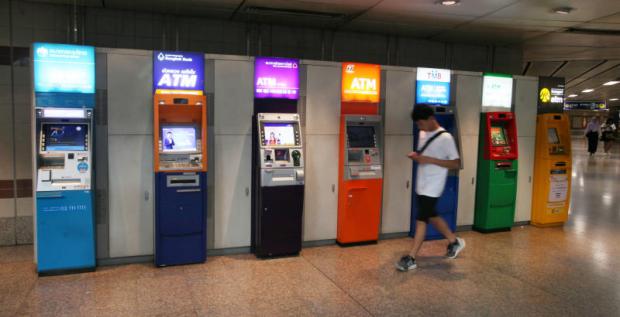
Banks' electronic money transfers, withdrawals and payment services crashed for several hours on Friday, with the blame laid on heavy interbank money transfers typically made at the end of the month at large banks.
The system failure could dent consumer confidence as Thailand hurtles towards the digital era and a cashless society.
The operational crash happened at Kasikornbank after interbank transactions flooded the KBank's electronic system, which also disrupted other banks' systems, particularly mobile banking service, said Ronadol Numnonda, assistant governor for the supervision group at the central bank.
"The Bank of Thailand monitored the problem and urged the banks to solve it urgently, as well as [temporarily] remove the troubled bank from the central system to alleviate the impact and let other banks resume operations," he said. "This process is in line with our procedures."
Veerathai Santiprabhob, governor of the Bank of Thailand, said KBank's system failure delayed other banks' money transfers via various channels. Transactions are typically large in volume and amount at the end of every month, he said.
Fund transfers via the mobile banking platform have increased significantly after the banking industry waived transaction fees for the online channel since late March. Adoption of new mobile banking features is another reason for the system glitch, Mr Veerathai said.
"The crash happened at the same bank that faced a similar problem last month," he said. "The bank's gateway is too narrow, like a bottleneck, making massive transactions clog the pipeline. This delayed transactions for the whole industry."
The Bank of Thailand is underscoring that all banks need to take care of customers affected by the glitch, Mr Veerathai said. Banks need to improve their infrastructure base to prepare for increased online transactions, he said.
Friday's system outage across banks was not the first. Users of the national e-payment system, PromptPay, experienced delays in cash transfers for about eight hours on Dec 31, 2017. The disruption was caused by computer glitches related to changing the calendar formatting for the new year.
Somkid Jiranantarut, chairman of Kasikorn Business Technology Group, KBank's technology subsidiary, said the bank's system crashed before 9am on Friday.
National Interbank Transaction Management and Exchange Ltd, the country's payment system network provider, cut off KBank's system from the others'.
KBank worked to fix the problem and completed its work around noon, Mr Somkid said.
A huge amount of transactions, internal network glitches and human error were the causes of the failure, he said, adding that KBank plans to improve its infrastructure.
KBank announced via social media that it would waive transaction fees for affected customers for interbank and cross-zone fund transfers, as well as bill payments through its ATMs. The bank plans to reimburse clients for fees by Sept 5.
The Thai Bankers' Association (TBA) said the glitch at some banks was because of an enormous amount of banking transactions in the morning, resulting in disruptions in some banking channels and delays or an inability to receive money.
The association said the system crash had nothing to do with cybercrime.
Most banks managed to resume operations as normal, the TBA said.
For customers who have not received money yet, their accounts will be adjusted by today, said the association.